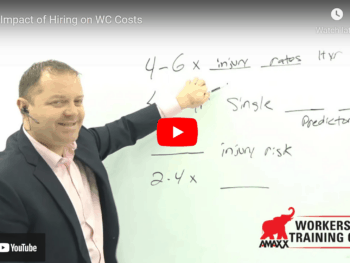
Understanding Written Job Offer Requirements
The requirements of a written job offer are outlined in greater detail in statute and regulation. There are also other factors to consider based on developed case law. Members of the claims management team and employer representatives should understand these jurisdictional specific requirements and carefully follow them. Always consult with an attorney when there are questions.
Back to the Basics: Preparing an Effective Written Offer
It is referred to in workers’ compensation as a “written job offer” because the most important requirement is that the offer for future employment following a work injury must be in writing. The nature of that written (paper copy versus e-mail) may also be subject to judicial interpretation. The result is the best offers are on a piece of paper and either directly handed to the employee or sent via certified mail/receipt request to ensure it was delivered. There is developing case law that suggests the offer can also be sent via email or tax.
There are also other basic requirements. These often include the following:
- The job offer must be suitable: There are varieties of issues to consider in this element. The offer must be something that is available at the date of injury employer at a wage commensurate with ability and skill;
- The job offer must be defined: These standards are often outlined in statute/regulation with supporting case law interpretations. General factors to include are that it be a part of an approved vocational rehabilitation plan, within the employee restrictions and produces an economic status as close as possible to the employee’s pre-injury condition;
- The job offer must be offered at the right time: It is important to understand if this job offer can be made before an employee reaches maximum medical improvement. This is an essential requirement in many jurisdictions with “timing” requirements; and
- The job offer must include detailed information: Important parts of any job offer should include a job title, wages and hours, physical demands of the position (detailed description of the work one would perform) and whether the employee is capable of performing this job with success given their physical and vocational limitations. This is often subject to a battle of vocational experts.
Failure to Accept an Appropriate Written Job Offer
The failure of an employee to accept or reject a valid written job offer can have significant implications for a workers’ compensation program. In many jurisdictions, this can include discontinuance of, or complete future forfeiture of one’s wage loss and vocational rehabilitation benefits. Most states do not limit an employee’s ability to receive future medical care and treatment based on the rejection or failure to accept a valid written offer. An attorney knowledgeable in a jurisdiction’s workers’ compensation law can provide a legal opinion on these matters.
Conclusions
Members of the claims management team and other interested stakeholders should seek creative ways to place an injured worker back to work to reduce workers’ compensation program costs. One such tool is preparing and giving an injured worker an effectively written job offer. When preparing this written offer, it is important to ensure it is received by the employee and meets the legal requirements of a workers’ compensation act.

Contact: mstack@reduceyourworkerscomp.com.
Workers’ Comp Roundup Blog: https://blog.reduceyourworkerscomp.com/
©2018 Amaxx LLC. All rights reserved under International Copyright Law.
Do not use this information without independent verification. All state laws vary. You should consult with your insurance broker, attorney, or qualified professional.











